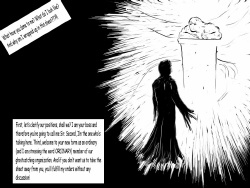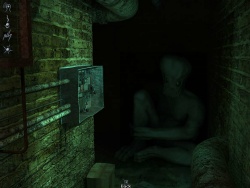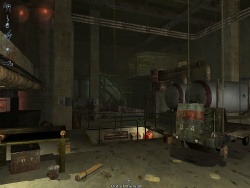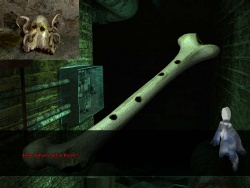|
Ghost in the Sheet
 An
errand in a factory populated by buckets, ladybugs and a head on a post is probably not most people's
idea of a good time, but having been hit by a truck, any outing is likely to be a good one. So it
is that the said ghost in the sheet heads off at the behest of the Boss to find out why the souls of
the dead are not getting to where they are supposed to. An
errand in a factory populated by buckets, ladybugs and a head on a post is probably not most people's
idea of a good time, but having been hit by a truck, any outing is likely to be a good one. So it
is that the said ghost in the sheet heads off at the behest of the Boss to find out why the souls of
the dead are not getting to where they are supposed to.
Being a sheet, the ability to do a whole lot is limited. So the Boss gives you telekinesis so you
can move things around. Soon after you acquire the ability to push things, removing the need to
pressgang pencils into action, and by the end you can electrically zap things, blow mighty winds, and
cast light upon the darkness, as well as a few other things.
Having obtained all those powers, you will have lured a fiend to a crunchy and tasty death, ended the
torment of the aforementioned head on a post, become enamoured of a shadowy female silhouette in the
shower, and serenaded a small octopussy looking thing on a bone flute. All in a days work really.
You can probably glean from the above that Ghost in the Sheet is a little bit different. Its also a
little silly, a little bit messy, a little bit funny, a little ambitious, and a little bit tricky. Put
all those little bits together, and whilst you don't get a great big plus, you do get a product that tries
hard to rise above your average run of the mill game and doesn't do a bad job at all.
 It
isn't as chaotic as I may have made it sound. The powers I referred to are utilised in a familiar
point and click environment - point to them and click where you want to use them, and you may or may not
get a reaction. You don't collect things in an inventory, and you don't carry things with you, but
telekineses allows you to move certain objects to achieve results, and the other powers enable you to
impact on your environment in useful ways as well. Need to open a door? Use the pushing power. Want to
power up a machine? Try an electric jolt. It
isn't as chaotic as I may have made it sound. The powers I referred to are utilised in a familiar
point and click environment - point to them and click where you want to use them, and you may or may not
get a reaction. You don't collect things in an inventory, and you don't carry things with you, but
telekineses allows you to move certain objects to achieve results, and the other powers enable you to
impact on your environment in useful ways as well. Need to open a door? Use the pushing power. Want to
power up a machine? Try an electric jolt.
The game world is almost an exclusively still one. Little animations will occur when you move things with
telekineses, and the limited number of non-playing characters have some minimal motion, but apart from two
little activity sequences, that's pretty much it. Cutscenes are also still, presented in a black and white
comic book style. Sequences unfold through images, like pages in a comic book. I thought they were well
done, and suited to the mood of the piece.
It isn't a big game world either, consisting primarily of about 7 or 8 rooms and their connecting halls.
Being a factory, it's a fairly drab place, but the palette and the detail are perfectly acceptable, if a
little minimalist.
I thought the puzzles and conundrums were rather good. I could have done without trekking back to switch
the power back and forth to where I needed it, but that was part and parcel of a faulty and limited power
source. Pushing and poking will serve you well as you try to get several machines started, and your brain
will likely get a mathematical workout on the last puzzle.
 There
are two in-game activity sequences, both of which require some timely clicking, one more hurriedly
than the other. However you can bypass them with a press of the space bar should you wish to do so, a design
mechanism that more games should include. I don't mind these types of interludes, but many players detest
them, and even for fans it can at times become irritating if that last click eludes you. So kudos on that one. There
are two in-game activity sequences, both of which require some timely clicking, one more hurriedly
than the other. However you can bypass them with a press of the space bar should you wish to do so, a design
mechanism that more games should include. I don't mind these types of interludes, but many players detest
them, and even for fans it can at times become irritating if that last click eludes you. So kudos on that one.
There is also a sound puzzle, which it seems by the game boards has produced a few palpitations. I found
that it wasn't so much the sounds that was the challenge, but working out what the heck the objective was and
how the puzzle worked. Once that was sorted, it was fairly plain sailing. The trick for me was not being
distracted by the sounds and the octopus thing I mentioned, but simply thinking of it as just another
mechanical puzzle, where discerning the action and reaction are the key.
Others though were clearly reduced to palpitations, and again the makers came through. You can download a
solve, which is introduced into the game in quite a nifty way. Just put it in your game directory, and banging
the right bucket solves the problem. You don't need to start a new game or anything complicated. I tried it
afterwards and it worked a treat, so again the makers need congratulating.
I had more difficulty with the dialogue and other game triggers in Ghost in the Sheet, and whilst
failing to find a key document is usually my fault and not a game issue, I did think some of the dialogue could
have operated in a more straightforward way. For instance, you seemingly have to ask the same character the
same things a few times to trigger a way forward, and another character wouldn't respond appropriately unless
I was standing in front of him, rather than behind him, despite him answering me from both places.
 A
plus though is that triggers on at least a couple of occasions (and probably more; I may simply have not
recognised the relationships) are multi-faceted, which allows you to play further into the game before hitting
a snag. If every game progression requires a single trigger, you can be very stop-start till you find that
trigger. Here, there were times when four or five trigger points were necessary in order to progress the game
past a key point, which meant much more gameplay was available before you reached that key point. A
plus though is that triggers on at least a couple of occasions (and probably more; I may simply have not
recognised the relationships) are multi-faceted, which allows you to play further into the game before hitting
a snag. If every game progression requires a single trigger, you can be very stop-start till you find that
trigger. Here, there were times when four or five trigger points were necessary in order to progress the game
past a key point, which meant much more gameplay was available before you reached that key point.
There is humour in Ghost in the Sheet, much of it black. The "no bleeding" comment was a particular
favourite. I did think however that much of the humour was forced, but as always, it's a personal thing. It
certainly tried to maintain a tongue in cheek style throughout, and didn't miss the mark by much.
Voice acting is fine, especially when you consider some of the creatures involved, and whilst the music
score is somewhat loopy and occasionally cheesy, it also has some fine moments. Despite some plot holes, I
thought the resolution was quite strong, and left the game prepared to come back if the hinted return sees
the light of day.
What else? Hotspots can be elusive at times, but that could have been my impatience as much as anything
else. Saves are apparently unlimited and a tutorial at the start will assist the most novice of game players
and alleviate any need for a manual. Squeamish players might squirm here and there, but I would have preferred
the horror feel to have been ramped up a bit; the balance for me wasn't quite right.
In the end, my experience with Ghost in the Sheet was one of lots of little things just taking the
edge off a very promising product. Still fun though, and not at all like other things, which in itself makes
it worthy of support.
Copyright © Steve Ramsey 2008.
All rights reserved.
System Requirements:
Windows 98SE/2000/XP/Vista, 1.4Ghz CPU, 512MB RAM, CD-ROM Drive, 300MB hard disk space, DirectX 8.0+ compatible
graphics and sound cards, keyboard, mouse
|
